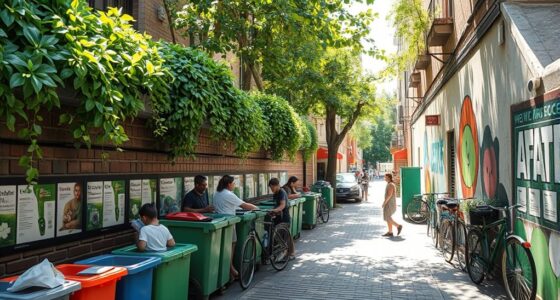Cities are embracing the sharing economy by promoting resource reuse, fostering community participation, and implementing eco-friendly practices. By sharing bikes, cars, and tools, you help reduce waste, lower pollution, and conserve energy. Community engagement turns residents into active participants, strengthening local bonds and supporting sustainability. Initiatives like sustainable event tableware further encourage responsible consumption. To see how these strategies create a circular future and what benefits await, keep exploring these innovative urban solutions.
Key Takeaways
- Cities promote resource sharing platforms to reduce waste and lower environmental impact through bikes, cars, and tools.
- Urban initiatives encourage community participation to foster trust, mutual support, and collective responsibility for sustainability.
- Implementing eco-friendly practices at community events, like sustainable tableware, raises awareness and promotes responsible consumption.
- Cities adopt the circular economy model, extending asset lifespan and minimizing landfill waste through shared usage and reuse.
- Engaging residents in local sustainability efforts strengthens neighborhood bonds and enhances the effectiveness of sharing economy programs.

Sharing Economy Secrets
The sharing economy has revolutionized how we access goods and services, often allowing you to save money, earn extra income, and reduce waste. As cities embrace this model, they’re not just creating new economic opportunities but also fostering urban sustainability. By sharing resources like bikes, cars, or tools, you help cut down on unnecessary manufacturing and consumption, which in turn lowers pollution and conserves energy. This shift encourages a more responsible use of resources, making cities more resilient and environmentally friendly. When residents participate in sharing platforms, they become active contributors to a circular economy, where materials stay in use for as long as possible, reducing landfill waste and promoting sustainable living.
Community engagement plays a crucial role in the success of these sharing initiatives. When you get involved, you’re not just a passive consumer but a participant in shaping your neighborhood’s future. Sharing platforms often thrive on local trust and cooperation, which strengthen community bonds. For example, by sharing a car with neighbors or exchanging goods within your community, you create a sense of connection and mutual support. This active participation encourages residents to take ownership of local sustainability efforts, making them more committed to maintaining clean, safe, and vibrant environments. Cities that prioritize community engagement tend to see higher participation rates, as people feel more invested when they see tangible benefits and trust the system. Additionally, integrating sustainable tableware options into community events can further promote eco-friendly practices and raise awareness about responsible consumption.
Frequently Asked Questions
How Do Sharing Economy Platforms Ensure Safety and Trust Among Users?
When using sharing economy platforms, you rely on trust verification and safety protocols to keep you secure. These platforms often verify user identities through ID checks or reviews, ensuring accountability. They also implement safety measures like secure payment systems, real-time ratings, and dispute resolution processes. By prioritizing transparency and security, they build trust among users, making it safer and more comfortable for everyone to participate in sharing services.
What Are the Biggest Challenges Cities Face When Adopting Sharing Economy Models?
Ever wonder what hurdles cities face with sharing economy models? You’ll find that aging urban infrastructure often struggles to support new platforms, causing congestion and inefficiency. Additionally, regulatory barriers create a maze that stifles innovation, as rules lag behind technological advances. To embrace the circular future, you need to navigate these challenges, updating infrastructure and crafting flexible policies that foster growth while maintaining safety and sustainability.
How Do Sharing Economy Initiatives Impact Local Small Businesses?
Sharing economy initiatives can boost local business collaboration by creating new opportunities for partnerships and increased visibility. They also foster community engagement, encouraging residents to support nearby shops and services. However, you should be aware that these initiatives might challenge traditional small businesses by introducing new competitors. To succeed, you need to actively participate in community events and build strong relationships, ensuring that sharing economy models complement rather than undermine local entrepreneurship.
What Policies Are Most Effective in Promoting Sustainable Sharing Practices?
You might think policies like green incentives and zoning reforms are just perks, but they truly promote sustainable sharing practices. Investigating these reveals they effectively encourage eco-friendly behaviors and responsible use of space. Green incentives motivate individuals and businesses to adopt sustainable options, while zoning reforms create designated areas for sharing services. Together, these policies foster a circular economy, helping cities reduce waste and support a greener, more collaborative future.
How Can Residents Participate More Actively in the Circular Economy Movement?
You can participate more actively in the circular economy by engaging in community programs and sharing initiatives. Attend local workshops and educational outreach events to learn how to reduce waste and reuse resources effectively. Get involved in neighborhood sharing projects, like tool libraries or clothing swaps, to foster community engagement. Your active participation not only helps promote sustainability but also inspires others to join the movement toward a circular future.
Conclusion
As you see, cities embracing the sharing economy are paving the way for a more sustainable future. By sharing resources, you help reduce waste and foster community connections. It’s clear that the circular economy isn’t just a trend—it’s a game-changer. So, don’t wait for others to lead the charge; get involved and show that you’re willing to walk the talk. After all, actions speak louder than words in shaping a better tomorrow.










